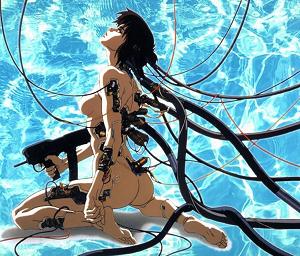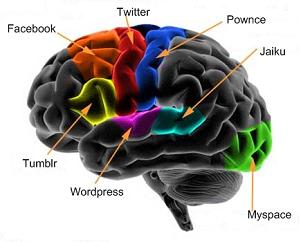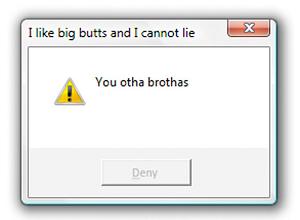We're All Doomed: The Internet is Alive (Maybe)
 | | This is the future, says Science |
Warning: anyone who has read Neuromancer or Ghost in the Shell may get a little nervous by the following science news. Two new studies, published within the last week, suggest that the brain operates more like the Internet than previously thought. This of course means the converse is also true: the Internet might operate more like a brain than previously thought. But not to worry, we can say with confidence that the Internet won't form a consciousness and decide to enslave the human race, because science knows exactly what consciousness is... Oh wait, strike that last sentence; science doesn't know jack about consciousness. Besides, we're already enslaved by the Internet.
The first study, published last week in the journal Science, hints at the possibility that memories are stored throughout the brain. The short of it is that they made rats develop a conditioned fear of certain sights, sounds, and smells. Then they cut off access to certain parts of the rats' secondary sensory cortexes and exposed the rats to the sights, sounds, and smells they were supposed to fear (after testing to ensure that the rats could still see, hear, and smell properly). The experimental rats didn't react as much as the control group, which strongly suggests that certain memories are stored in parts of the brain previously thought to only house sensory processes.
 | | Pictured: an actual diagram of the Internet |
The second and more important study, published yesterday in Proceedings of the National Academy of Sciences, deals specifically with how information is transfered throughout the brain. The general 20th Century consensus was that the brain is organized like a hierarchy: all the individual parts of the brain report to a focal point where consciousness exists. However, this study, the details of which are too complicated to get into here, suggests that the circuitry of the brain is wired in closed loops, which helps explain why scientists have never been able to locate a focal point in the brain and why the brain can suffer extensive damage and still function. As the study itself explains, the general idea is that the brain might be set up more like a network of computers than like a single computer.
None of this should really surprise anybody familiar with the history of neuroscience. Over at least the last two hundred years, people have used technology-based analogies to describe the brain. We learned how electricity could power a lightbulb, and so we started thinking of the brain as the seat of power in the body. We learned how bundles of wires could transmit information, so we started thinking of the brain as a municipal power grid or telephone switchboard. We learned how electricity can form images, and so we used the television to explain how the brain perceives sensation. We created computers, and so we started thinking of the brain as a supercomputer. Now we have the Internet, so it makes sense that we'd start thinking of the brain as a miniature computer network.
 | | Computers might get songs stuck in their heads too |
These analogies are extremely useful and have helped us learn more about how the brain works, but at the end of the day, they are all flawed. In fact, the brain is far more complex than anybody imagines, and we still have a long way to go before we unravel all of its mysteries. The biggest mystery of them all, of course, is consciousness.
Some scientists argue that consciousness doesn't really exist, that it's just an abstract construct as illusive as the soul. Most proclaim that consciousness is only formed by complex interactions we do not yet comprehend. Still others see consciousness as the sum of hundreds of trillions of synaptic firings, that consciousness can exist in primordial form through the most basic of connections. It is this last hypothesis that is the most troubling for us William Gibson fans, because that means that the Internet--and even our individual computers--might have some form of basic consciousness. This makes me feel a little nervous as I type, the thought that each keystroke is being "felt" by my laptop.
 | | Whoa. |
It also reminds me of sci-fi from the middle of the last century. You know the basic story: aliens land on Earth, judge our culture based on the nuclear bomb or something, and decide we cannot be trusted. But instead of aliens, plug in a suddenly aware computer network. Now we're talking Skynet, I, Robot (the movie), the matrix, Battlestar Galactica (the new one), or something else along those lines. Is it possible? Might scientists somewhere one day flip a switch and give birth to a new form of artificial life?
Science is marching forward in pursuit of answers. Indeed, there are projects currently underway that could create consciousness, either intentionally or accidentally. One such project, the Blue Brain Project, sounds eerily similar to (*SHAMELESS PLUG ALERT!*) a short story I wrote over a decade ago called "Somatoform Purgatory," (published in Dark Moon Digest #6) in that it is essentially trying to build a brain from the ground up. However, the Blue Brain Project is using neurons instead of computer circuits, so I guess my story falls more in line with whole brain emulation, something else people are trying to do out there.
Still, while I fully endorse preparing for the robot apocalypse, we might not need to panic. Consciousness in a machine does not inevitably lead to the enslavement or eradication of the human race. If we create consciousness based on the human brain, this consciousness will probably think a lot like we do, and if there's one thing history has taught us about people, it's that they can easily be controlled with mindless entertainment. If the Internet itself comes to life, it will be as retarded as a 4chan troll who posts YouTube videos of monkeys playing tennis and visits Failblog every day. I'm not saying I'm against monkeys playing tennis, because let's face it, if we keep the Internet as retarded as possible, it will never be smart enough to enslave the human race.
-e. magill 8/10/2010
|
|